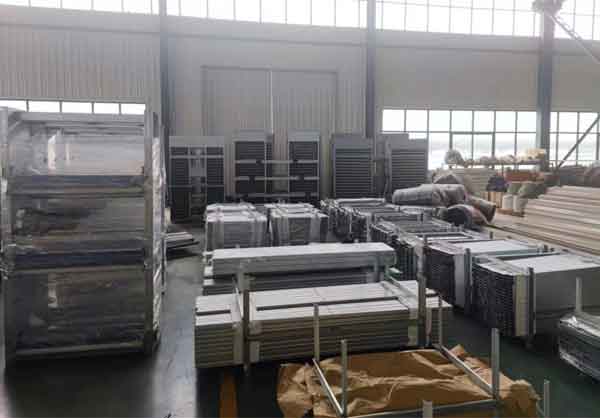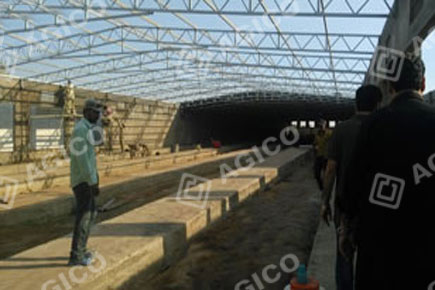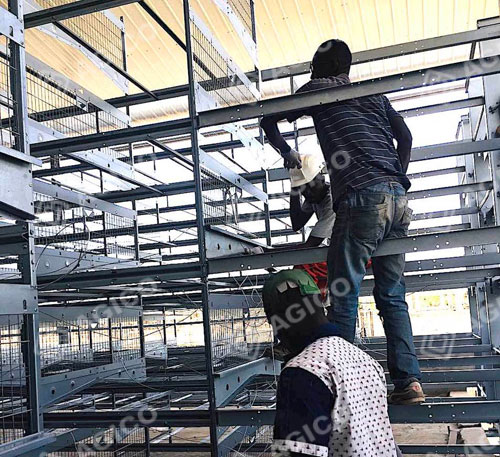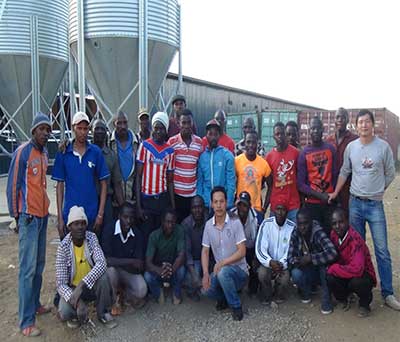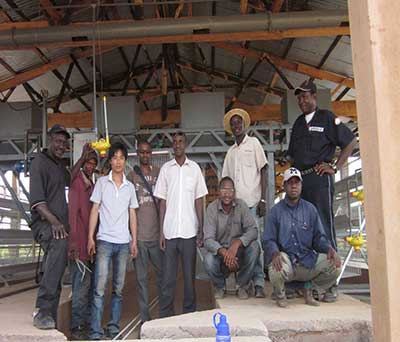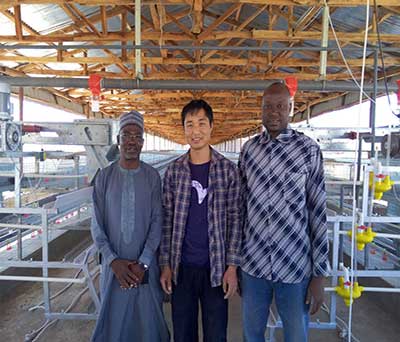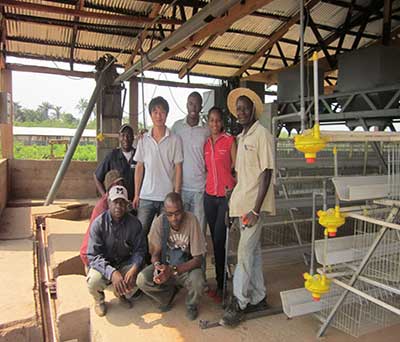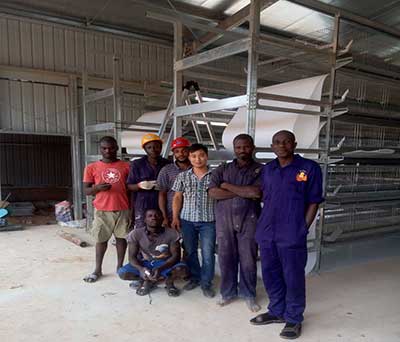The symptoms of laying hens are very obvious after heatstroke in laying hens, with reduced feed intake, increased water intake, and respiratory symptoms. It is found that the laying hens that have suffered heatstroke need to be treated as soon as possible to be well controlled. In addition, in the high temperature summer, do a good job of preventing heatstroke and cooling, and provide the chickens with sufficient drinking water, which can effectively prevent the laying hens from heatstroke.
What are the symptoms of heat stroke in laying hens?
Sick chickens mainly show rapid heartbeat, difficulty breathing, mouth breathing, some purring sounds from the throat, reduced feed intake, and some even stop feeding, but significantly increased drinking water, depressed spirit, and reduced activities, body temperature continued to rise, dizziness would occur later, unable to stand or walk stably, physical collapse, and then death due to shock. In addition, the egg production of laying hens will also be significantly reduced, smaller eggs will be produced, and the egg shell will become brittle and thin, the surface will be very rough, and the number of broken eggs will increase significantly.
How to treat heatstroke in laying hens?
Sodium bicarbonate can effectively prevent acidosis caused by excessive temperature, thereby controlling the number of deaths, and can also improve the quality of eggshells. Generally, 0.3% can be added to the feed, and 0.1% can be added to the drinking water. Drink it every morning and evening, which has a better control effect.
Vitamin C enhances stress resistance, prevents infection, and improves egg production. 5-10g of vitamin C can be added to every 100kg of drinking water, and 10 to 20g of every 100kg of feed. If the laying hens reduce their feed intake, it is best to take the drink.
In addition, an appropriate amount of other vitamins should be added, which also has an important health care effect, which can improve the quality of eggshells, enhance the body’s immunity, and avoid polydipsia and diarrhea. Ammonium chloride can effectively avoid alkalosis caused by excessive breathing in sick chickens, thereby preventing the soft shell disease caused by it. Generally add 0.3% in drinking water, drink it in the morning and evening every day.
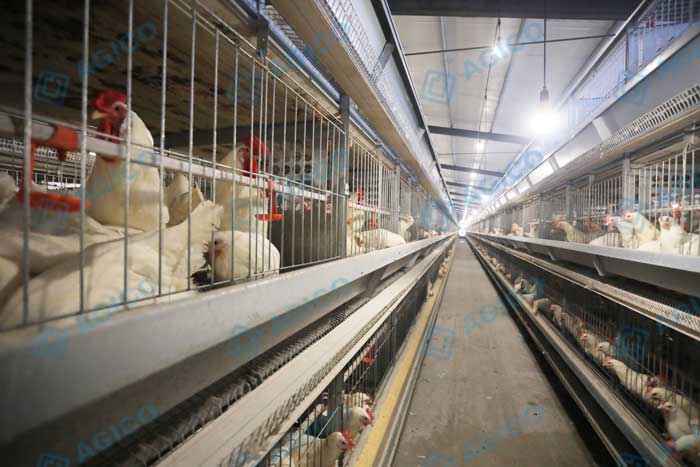
How to prevent heat stroke in laying hens?
- Lower laying hens cages’ temperature. The house should be properly ventilated to improve the ambient temperature and conditions. Chicken houses and flocks can be sprayed with deep well water for several times in the afternoon to cool down, all doors and windows are opened to promote the formation of convection, and necessary ventilation facilities are installed. If the cage is relatively simple, the roof can be shaded to prevent direct sunlight. At the same time, planting trees, lawns, vines and other plants around the chicken house can not only evaporate a large amount of water vapor to increase heat dissipation, but also keep the air moist and reduce dust.
- Sufficient supply of clean drinking water. Under normal circumstances, about 73% of the egg is water, and about 65% to 70% of the chicken body is water. In addition, it is not possible to drink water intermittently, and at the same time add an appropriate amount of soluble vitamins, especially vitamin C, to the drinking water, which can effectively inhibit the rise of body temperature and promote the increase of egg production rate.
- Timely cleaning of manure. If the temperature in the house is too high, it is easy for the chicken manure to produce a large amount of water vapor and harmful gases such as hydrogen sulfide and ammonia through evaporation, resulting in a significant increase in the humidity in the house, which is prone to diseases such as Escherichia coli and coccidia. When the concentration of harmful gases in the house reaches a certain level, respiratory diseases are prone to occur. Therefore, to remove the feces in the house in time, it is best to use mechanical cleaning. If only manual feces can be used, it should be carried out at 14 to 15 o’clock every day, and the septic tank should be sprayed and disinfected immediately after cleaning.
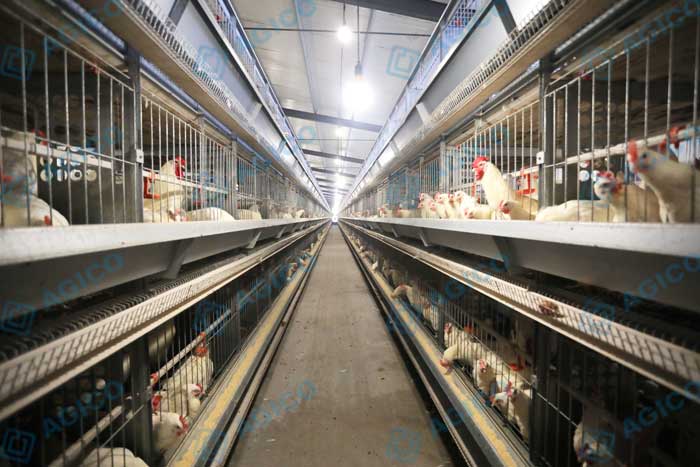
In recent years, with the construction of agricultural standardization, the rural poultry farming industry has actively transformed the farming methods, transformed and developed in the direction of large-scale, intensive and automated, and also reduced the cost of farming.
The smart breeding chicken house developed by our company adopts the latest fully automated and professional laying hen breeding equipment such as climate controlling system, central feeding system, central egg collecting system, and central manure cleaning system. Drinking water, feeding, ventilation, temperature adjustment, etc. are all digitalized intelligent controlled. Keeping warm in winter and cooling in summer, the laying hens in the house under constant temperature are free from disease throughout the year, further ensuring the health and safety of the eggs produced. The fully automatic mechanized operation mode effectively guarantees the clean and hygienic environment of the farm, and has zero external emissions, creating a circulating, green, and zero-pollution laying hen breeding base.

